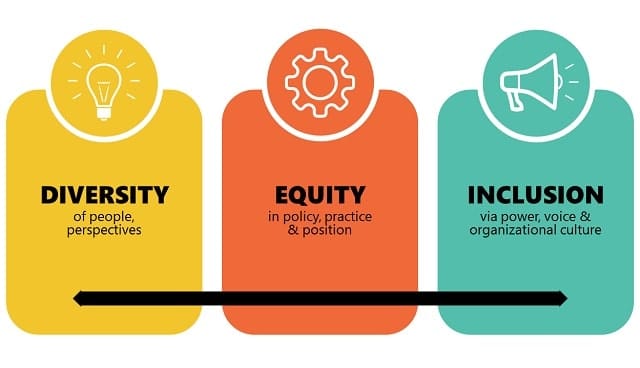Advancing Organizations through Diversity, Equity, and Inclusion (DEI) Initiatives

In recent years, Diversity, Equity, and Inclusion (DEI) have emerged as critical pillars for organizational success, reflecting a growing recognition of the value inherent in diverse perspectives, backgrounds, and experiences. Beyond mere buzzwords, DEI initiatives represent a commitment to creating environments where all individuals feel respected, valued, and empowered to contribute their best work. In this blog, we'll delve into the importance of DEI initiatives, their benefits, and strategies for effectively implementing them within organizations.
Understanding Diversity, Equity, and Inclusion:
Diversity encompasses the range of identities that individuals bring to the table, including but not limited to race, ethnicity, gender, sexual orientation, age, religion, disability status, and socio-economic background. Equity involves ensuring fairness and impartiality in processes, policies, and practices, thereby leveling the playing field for all employees. Inclusion, on the other hand, is about creating an environment where diverse individuals feel welcomed, respected, and valued, with their voices heard and contributions acknowledged.

The Business Case for DEI:
Beyond being a moral imperative, DEI initiatives also make solid business sense. Diverse teams are more innovative and creative, as they bring a wider range of perspectives to problem-solving and decision-making processes. Research consistently shows that companies with diverse workforces outperform their less diverse counterparts in terms of financial performance and market competitiveness. Additionally, fostering an inclusive workplace culture can enhance employee engagement, retention, and overall morale.
Key Benefits of DEI Initiatives:
- Enhanced Innovation: Diverse teams are better equipped to develop innovative solutions to complex problems, as they bring a variety of perspectives and approaches to the table.
- Improved Decision Making: By incorporating diverse viewpoints, organizations can make more informed and well-rounded decisions, leading to better outcomes.
- Attracting Top Talent: Companies that prioritize DEI are more attractive to top talent, particularly among younger generations who place a high value on diversity and inclusion in the workplace.
- Better Employee Engagement and Retention: Inclusive environments foster a sense of belonging among employees, leading to higher levels of engagement and lower turnover rates.
- Enhanced Reputation and Brand Image: Organizations that demonstrate a commitment to DEI are viewed more favorably by customers, investors, and the broader community, leading to a positive brand image and reputation.
Strategies for Implementing DEI Initiatives:
- Leadership Commitment: DEI initiatives must start from the top, with visible and vocal support from organizational leaders. Leaders should champion DEI efforts, allocate resources, and hold themselves and others accountable for progress.
- Education and Training: Provide comprehensive DEI training for employees at all levels of the organization to raise awareness, build empathy, and foster understanding of diverse perspectives.
- Recruitment and Hiring Practices: Implement bias-free recruitment and hiring practices to attract diverse candidates and ensure equitable opportunities for all applicants.
- Inclusive Policies and Practices: Review and revise organizational policies and practices to eliminate biases and create an inclusive work environment. This may include flexible work arrangements, accommodations for disabilities, and inclusive language in communications.
- Employee Resource Groups (ERGs): Establish ERGs to provide support, networking opportunities, and a sense of community for employees from underrepresented groups.
- Measurement and Accountability: Set clear DEI goals and metrics, and regularly track progress toward achieving them. Hold leaders and teams accountable for advancing DEI within their respective areas of responsibility.
Conclusion:
Diversity, Equity, and Inclusion (DEI) initiatives are not just a moral imperative but also a strategic business imperative. Organizations that prioritize DEI stand to benefit from enhanced innovation, improved decision-making, and better employee engagement and retention. By fostering environments where all individuals feel valued and empowered, organizations can create a more inclusive and equitable workplace that drives success and prosperity for all.
Work-life balance isn't just about managing your time—it's about designing a lifestyle that aligns with your values and priorities. At scale.jobs, we believe that achieving balance doesn't mean sacrificing style or efficiency. Whether you're juggling multiple projects or seeking ways to recharge outside of work, we've got you covered with chic and practical solutions to elevate your professional and personal life.




